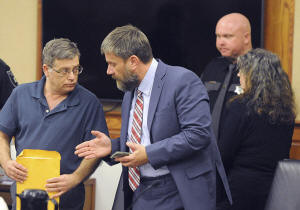West Virginia couple convicted of forced labor, human trafficking of
adopted kids
 Send a link to a friend
Send a link to a friend
 [January 30, 2025]
By JOHN RABY [January 30, 2025]
By JOHN RABY
CHARLESTON, W.Va. (AP) — A West Virginia couple accused of neglect and
forced labor involving their adopted children was convicted by a jury on
Wednesday after eight hours of deliberations.
Jeanne Kay Whitefeather and Donald Ray Lantz went on trial in
mid-January and each faced over a dozen counts, including forced labor,
civil rights violations, human trafficking and child neglect.
The couple, who are white, were accused of mistreating their children —
all of whom are Black — by locking them in a shed, forcing them to sleep
on the floor and use buckets as toilets, and more.
The Kanawha County Circuit Court jury convicted Whitefeather on all 19
counts against her, including the civil rights violations. Lantz was
found guilty on 12 counts out of 16. He was acquitted of four counts of
civil rights violations. Both showed little emotion as the verdict was
read.
Kanawha County Prosecuting Attorney Debra Rusnak said she cried as she
heard the word “guilty” repeated again and again.
“These cases mean a lot to us — we take a lot of this personally," she
said at a news conference afterward. "This is our community, and these
are the children of our community. If we’re not going to fight for them,
then who will?”
Whitefeather and Lantz adopted the five siblings while living in
Minnesota, moved to a farm in Washington state in 2018, and then brought
the family to West Virginia in May 2023, when the children ranged in age
from 5 to 16.

The couple was arrested in October 2023 after neighbors saw Lantz lock
the oldest girl and her teenage brother in a shed and leave the
property. A deputy used a crowbar to get them out.
Inside the main residence, a 9-year-old girl was found alone crying in a
loft with no protection from falling, according to a criminal complaint.
A fourth child was with Lantz when he eventually returned. Deputies were
later led to the couple’s youngest daughter.
The children were found in dirty clothes and smelling of body odor,
deputies said, and the eldest boy was found barefoot with what appeared
to be sores on his feet.
All five were turned over to Child Protective Services after the
couple's arrest.
During the trial, neighbors in Sissonville testified they never saw the
children play and witnessed Lantz make them stand in line or perform
difficult chores around the yard, including lifting heavy items. After
Lantz noticed the curious neighbors, the children mostly stayed indoors.
The couple’s eldest daughter, now 18, testified that the outdoor work
occurred mostly in Washington and that some of them were forced to use
their hands for digging.
She also said the children were fed a steady diet of peanut butter
sandwiches at scheduled times, some left over from a previous meal. Some
kids were forced to stand in their rooms for hours and keep their hands
on their heads. The oldest girl and boy shared a room, including the
same bucket for using the bathroom while the other held up a sheet for
privacy.
The couple and their attorneys pushed back on the accusations, with
Lantz testifying that the chores were assigned to teach the children
responsibility.
Whitefeather called the shed the children were found in a “teenager
hangout” and said the teens had access to a key and were free to leave
as they pleased.
[to top of second column]
|

Donald Lantz, left, speaks with his attorney John Balenovich as his
wife Jeanne Whitefeather, right, leaves the courtroom in Kanawha
County Circuit Court in Charleston, W.Va. on Wednesday, Jan. 29,
2025. (Christopher Millette/Charleston Gazette-Mail via AP)

Whitefeather’s attorney said the oldest boy had attempted to run
away from home and the lock on the shed was meant to keep him from
trying again.
Testimony showed the children didn’t know where a key was —
detectives found one out of sight on a cabinet in the shed.
Prosecutors said the couple’s tactics were less about teaching
responsibility and instead about control.
“The whole point of treating them this way is they become less than
human,” Kanawha County Assistant Prosecutor Chris Krivonyak said.
Krivonyak added, “How do you do that to someone you love?”
Prosecutors also entered racist text messages into evidence that
they said were from Whitefeather, who denied writing them. The
oldest daughter testified the children were cursed at “all the time”
and that Whitefeather used racist language.
Whitefeather also refused to eat off the same plates used by the
children, whom she referred to as “dirty,” the girl testified.
“You want to know what racists look like?” Assistant Prosecutor
Madison Tuck asked the jury, then pointed to the defendants. “Look
at them.”
The defense argued the couple was simply overwhelmed with trying to
get help for the children’s mental health issues, abuse and trauma
from their biological home.
Lantz’s attorney, John Balenovich, said the state’s child welfare
agency, which the family requested help from several times, “dropped
the ball the most in this case.”
Tuck said the couple never sought help for the oldest boy despite a
behavioral health clinic being just minutes from their home.
A forensic psychologist for the prosecution testified that the
couple’s treatment of the children had worsened their conditions.
The eldest boy, whose physical altercation with Whitefeather in 2022
was cited by attorneys as the start of the family’s internal
struggles, currently is receiving full-time care in a psychiatric
facility.
Whitefeather’s attorney, Mark Plants, said during closing argument
that the couple was only guilty of making poor parenting decisions.

“These are farm people that do farm chores,” Plants said. “It wasn’t
about race. It wasn’t about forced labor.”
Whitefeather faces a maximum of 215 years in prison while Lantz
could receive up to 75 years in prison.
The couple will return to Kanawha County Circuit Court for
sentencing on March 19.
___
Associated Press reporter Leah Willingham contributed to this
report.
All contents © copyright 2025 Associated Press. All rights reserved |